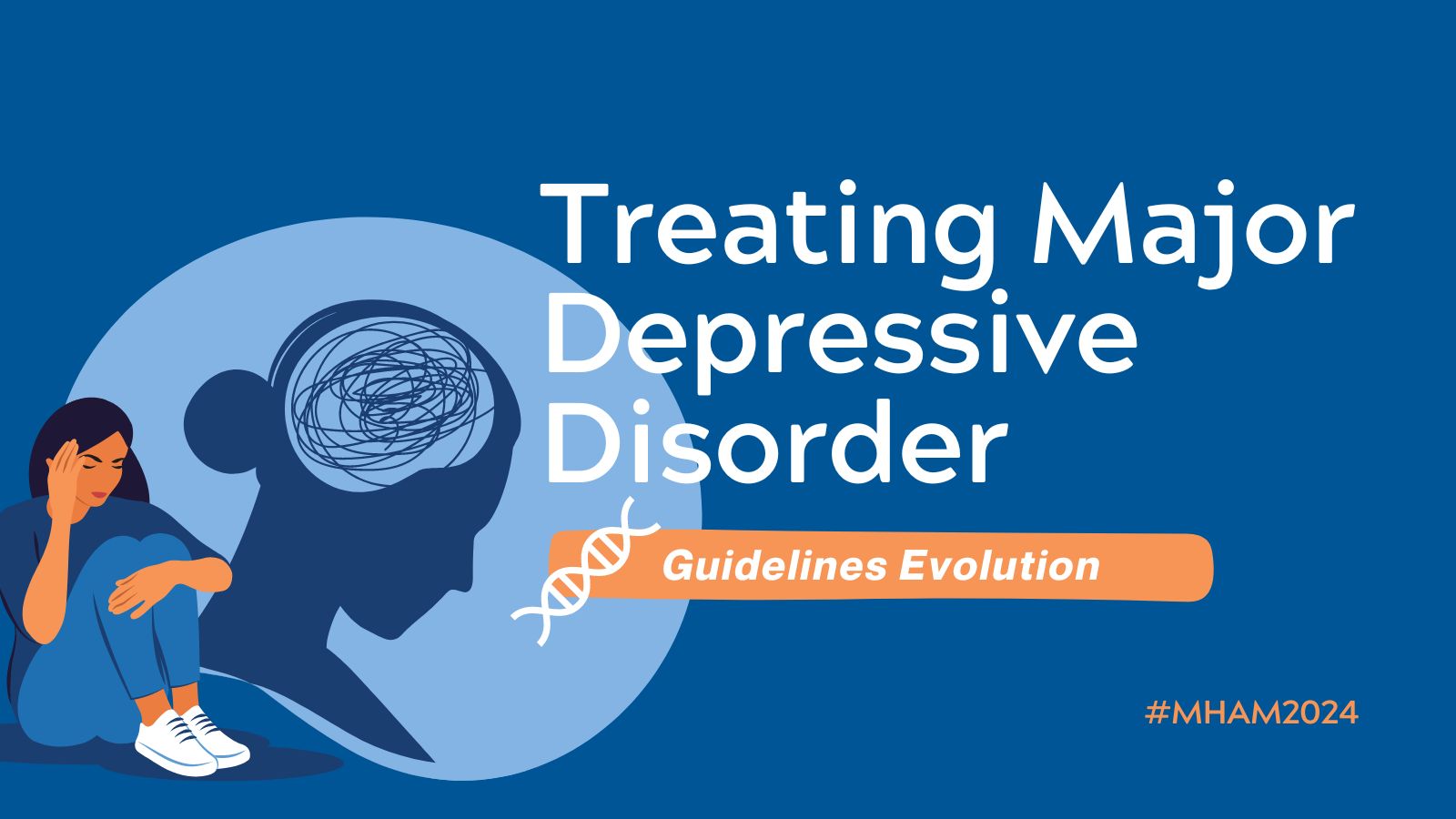
In honor of Mental Health Awareness Month 2024, we will be examining the most recent guidelines on major depressive disorder (MDD). Surprisingly, there are not many US-based guidelines for the management of MDD. The most recent guideline was actually published by the Department of Veterans Affairs and the Department of Defense (VA/DoD) in April 2022. Since that time, there have been FOUR new medications approved for patients with Major Depressive Disorder. This post will take a look at what has changed since then, and what the next Clinical Practice Guidelines for MDD may look like after those recent FDA medication approvals.
Part 1 – Current MDD Guidelines
To start, here is a listing of the current major depressive disorder guidelines in the US:
- Management of Major Depressive Disorder (VA/DoD) (April 2022)
- Nonpharmacologic Versus Pharmacologic Treatment Of Adult Patients With Major Depressive Disorder (ACP) (March 2016)
- Treatment of Depression Across Three Age Cohorts (APA / Psychology) (February 2019)
- Treatment of Patients With Major Depressive Disorder (APA / Psychiatry) (October 2010)
- Assessment and Treatment of Children and Adolescents With Major and Persistent Depressive Disorders (AACAP) (October 2022)
Other guidelines that deal with depression, but not necessarily MDD include:
- Anxiety and Depression in Adult Survivors of Cancer (ASCO) (April 2023)
- Cannabis for Psychological Symptoms Including Insomnia, Anxiety, and Depression (MASCC) (February 2023)
- Delirium, Dementia And Depression In The Long-Term Care Setting (AMDA/PALTC) (January 2019)
- Treatment of Depression in Adults with Epilepsy (ILAE) (October 2022)
- Evaluation And Treatment Of Perimenopausal Depression (NAMS) (February 2019)
- Depression Following Acute Coronary Syndrome (AAFP) (June 2019)
- Treatment and Management of Mental Health Conditions During Pregnancy and Postpartum (ACOG) (May 2023)
- Suicide and Suicide Risk in Adolescents (AAP) (December 2023)
Part 2 – FDA Approvals Since The Most Recent Guidelines
The medications/therapies that have been approved by the FDA since the last MDD clinical guideline published in April 2022:
- Rejoyn Prescription App for iTunes and Google Play
- Otsuka / Click Therapeutics
- Approved April 2024
- Treatment of major depressive disorder (MDD) symptoms as an adjunct to clinician-managed outpatient care for adult patients with MDD age 22 years and older who are on antidepressant medication
- Gepirone (Exxua)
- Fabre-Kramer Pharmaceutical
- Approved September 2023
- To treat major depressive disorder
- Cariprazine (Vraylar)
- AbbVie
- Approved December 2022
- adjunctive therapy to antidepressants for the treatment of major depressive disorder (MDD) in adults
- Bupropion/dextromethorphan (Auvelity)
- Axsome Therapeutics
- Approved August 2022
- For the treatment of major depressive disorder (MDD) in adults
And these medications were also approved shortly before the 2022 guideline:
- Lumateperone (Caplyta)
- Intra-Cellular Therapies
- Approved December 2021
- Treatment of adults with depressive episodes associated with bipolar I and II disorder, as monotherapy or adjunctive therapy with lithium or valproate
- Esketamine (Spravato)
- Janssen
- Approved August 2020
- To treat depressive symptoms in adults with major depressive disorder (MDD) and acute suicidal ideation or behavior
Part 3 – Predictions
Now that we’ve covered the listing of current MDD guidelines, as well as the new FDA approvals and “what’s changed since” the last major depressive disorder guidelines were published, we can jump into the predictions. This is a list of predictions focused specifically on treatment of MDD, and mainly on pharmacological treatment in adults. Also, this isn’t a prediction for a specific guideline or specific organization – these are broad predictions covering the next guideline(s) on the topic, regardless of which organization produces them.
Prediction 1
We believe there will be a greater emphasis on shared decision making for patients with MDD. This is a trend across all areas of medicine, and the emphasis on SDM for MDD seems all but a given. We figured we would start off our predictions with what we think will be an easy one!
Prediction 2
If the next MDD guidelines publish in the next 18 months, we predict that there will not be any recommendation “for” OR any recommendation “against” the recently approved Rejoyn prescription app. However, if the next guideline comes in 2026 or later, there will likely be a “for” recommendation. Given how new the concept of an FDA-approved mobile app is, we predict there may be some hesitancy to provide a “for” recommendation until sufficient data has been collected over time.
Prediction 3
There will be a new “for” recommendation included for cariprazine (Vraylar).
Prediction 4
We predict recommendation(s) endorsing earlier usage of esketamine (Spravato). The current VA/DoD guidelines recommend against esketamine, except as a suggested option for patients who have not responded to several adequate pharmacologic trials. However, we’re predicting that the next guidelines will include a stronger “for” recommendation and will also specify that it can be used earlier in the presence of suicidal thoughts or actions (and not just multiple failed trials with other medications.
Prediction 5
There will be a new “for” recommendation included for bupropion/dextromethorphan (Auvelity).
Prediction 6
Rather than a single guideline for major depressive disorder, we may see multiple MDD guidelines that deal with special populations and/or co-occurring disorders, such as patients with suicidal thoughts.
There you have it – an overview of the current MDD guidelines, what major changes and FDA approvals have happened since, and our informal predictions for what the next guidelines on major depressive disorder may include. Once the next MDD guideline update happens, we will compare our predictions to reality to see how we scored. Here’s hoping for a 5 out of 5!
Do you agree with our predictions? Do you think we missed anything? And is there another topic you would like to see covered in a future guideline predictions series article? Contact us today and let us know!
Copyright © 2024 Guideline Central, All rights reserved.